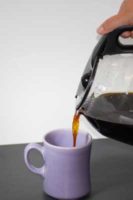01 Mar Does Caffeine Really Affect Your Sleep?
MedicalResearch.com Interview with:
 Julia F. van den Berg, PhD
Julia F. van den Berg, PhD
Leiden University, Department of Clinical Psychology
Leiden, The Netherlands
MedicalResearch.com: What is the background for this study? What are the main findings?
Response: Caffeine is the most used psychoactive substance worldwide, mostly consumed via coffee, energy drinks, tea and chocolate. Experimental studies have shown that caffeine can negatively affect sleep quality. The timing of caffeine consumption may play a role; the closer to bedtime, the more caffeine consumption is likely to have a negative effect on sleep. We also wondered if chronotype, being a morning or evening person, would make a difference in the effect of caffeine on sleep.
We sent out questionnaires on sleep quality, chronotype, and a detailed questionnaire on type and timing of caffeine use to 880 secondary education students (mean age 21.3 years). We found that for the entire group, the amount of caffeine per week was not associated with sleep quality, regardless of chronotype. However, when we divided the group into subgroups of students who did, and students who did not usually consume caffeine in the evening (after 6PM), we found something interesting. Only for students who did not consume caffeine in the evening (20% of the total sample), a higher total caffeine consumption per week was associated with poorer sleep, in spite of the fact that these students consumed a lot less caffeine per week than the group who did consume caffeine in the evening.
This suggests a self-regulatory mechanism: students who know they are sensitive to caffeine do not drink it in the evening, nevertheless, the caffeinated beverages they drink during the day do affect their sleep.
MedicalResearch.com: What should readers take away from your report?
Response: The popular belief that caffeine consumption in the evening generally impairs sleep quality seems to have been refuted by our work. Our study showed that only a minority of people suffer from poor sleep as a result of caffeine consumption. And for those people, this effect is present even if they do not consume caffeine after 6PM.
MedicalResearch.com: What recommendations do you have for future research as a result of this work?
Response: It would be very interesting to find a non-invasive way to identify caffeine-sensitive persons, for instance by means of saliva or urine sampling. If a person’s caffeine sensitivity is known, it is possible to give tailor-made advice about the prevention of sleep problems by reducing caffeine intake. For non-caffeine sensitive persons with sleep problems, other sleep-improving measures than reducing caffeine are needed.
No disclosures
Citations:
Evening use of caffeine moderates the relationship between caffeine consumption and subjective sleep quality in students
Added (26.02.2018)
Authors: Mirjam L. Kerpershoek, Niki Antypa, Julia F. Van den Berg
10.1111/jsr.12670
Journal: Journal of Sleep Research
[wysija_form id=”3″]
The information on MedicalResearch.com is provided for educational purposes only, and is in no way intended to diagnose, cure, or treat any medical or other condition. Always seek the advice of your physician or other qualified health and ask your doctor any questions you may have regarding a medical condition. In addition to all other limitations and disclaimers in this agreement, service provider and its third party providers disclaim any liability or loss in connection with the content provided on this website.
Last Updated on March 1, 2018 by Marie Benz MD FAAD
